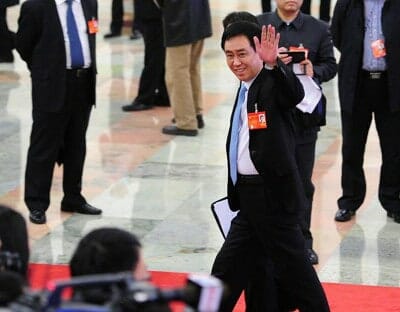
Evergrande boss Xu Jiayin waves to an unidentified journalist to thank them for all the free publicity
International media from Bloomberg to the New York Times carried headlines today declaring that Evergrande Real Estate, a Guangzhou-based developer noted for its aggressively leveraged balance sheet, had just received 100 billion yuan ($16 billion) in new credit to prop up its business.
Analysts immediately got to work examining if this was a case of a “too big to fail” developer getting a government sponsored bailout to avert catastrophe, or perhaps another instance of collusion between state-owned banks that had grown too chummy with their real estate mogul client.
What most observers seem to have missed, however, is that Evergrande never received a dime in new financing, and has no more access to credit today than it did last week or last month.
What the China property giant did get, however, was a shower of free publicity from a credulous media, and the illusion that it has newfound support for its balance sheet.
One Powerful Press Release
What Bloomberg’s story “(Evergrande Gets 100 Billion Yuan Credit Lines as Sales Decline)” the New York Times blog post “(Chinese Developer Evergrande Gets $16 Billion Lifeline Amid Slump)” or more breathlessly, the Business Insider’s bit “(China came THIS close to another massive property developer default)” have in common is that all were triggered by a press release distributed on Tuesday.
A press release issued by Evergrande.
In the PR document, Evergrande announces that the Bank of China has provided it with “a Credit Line of RMB 30 Billion in the Strategic Partnership Agreement.” The release also makes it clear that Evergrande had entered a similar partnership with the Agricultural Bank of China, that involved a RMB 20 billion credit line, and had two more deals with China’s Minsheng Bank and Postal Savings Bank for RMB 50 billion more.
All of this is true, and great PR, but meaningless in terms of finance.
Gaining Face Without Getting Any Cash
To find out more about these surprising financial transactions, Mingtiandi spoke with a senior executive in China’s real estate finance industry.
The industry insider clarified that the key point to understand is the meaning of a “line of credit” in this context. At this point none of the banks have loaned any money to Evergrande, or even agreed to loan the developer any cash.
“What the banks have done, is agreed to consider loaning cash to Evergrande, or to one of its projects, if they come up with a worthwhile proposal that appears creditworthy,” the executive pointed out (after making it clear that they had no direct knowledge of this particular case).
However, the financier pointed out that the banks would be just as likely to fund a worthy project even without any “Partnership Agreement,” or line of credit.
But without these widely announced agreements, Evergrande would not gain the publicity value of appearing to have just received $16 billion in new funding.
Don’t Underestimate Evergrande’s PR
Anyone who has covered China’s real estate market for an extended period of time will get accustomed to a stream of gushing PR releases from Evergrande. Many of these are aimed at countering concerns about the company, particularly over its finances. (Often with endearingly Chinglishy headlines thrown in as a bonus).
In recent months, the company has distributed the following:
- Evergrande Tops the List of 2014 Domestic Property Sale with RMB 131.5 Billion
- Cash Balance of EVERGRANDE GROUP Reaches 64.03 Billion Yuan, Ranks No.1 in China; HuiKa Yan Announces Multiple Business Strategies
- Evergrande Realizes a Simultaneous Growth of Volume and Price with a Half-year Sales Amount of 69.32 Billion
- Multi-indicator of Real Estate Market Continues to Grow and “Overall Warming” Becomes the Consensus
- Evergrande’s Sales Volume Reaching 56.21 Billion Yuan, Makes a New Record in History with Its Synchronous Rise on Production and Price
While the developer didn’t claim “a New Record in History” with this latest missive, it does seem to have received some pretty strong ROI on its PR yuan.
Evergrande Now Diversifying into the Potemkin Loan Business?
And PR is what these partnership agreements with the banks have been about.
The bank has no particular reason to sign a partnership agreement or offer a line of credit to Evergrande if there is no actual transaction taking place. However, if a major customer that happens to be one of China’s ten biggest real estate developers asks for a meaningless agreement as a favour, the bank also doesn’t have a lot of reasons to not go along with the public relations maneuver.
So you could label these ethereal credit lines as a “win-win” situation for Evergrande and its banking partners, or you could say that the lenders are “giving Evergrande face.”
But the banks haven’t given the Guangzhou-based company any new cash, and Evergrande still hasn’t taken any meaningful steps to shore up its shaky balance sheet. Other than getting a 0.87 percent boost in its stock price today – no doubt thanks in part to all of the free publicity.
[…] Update: It was a Potemkin bailout. […]